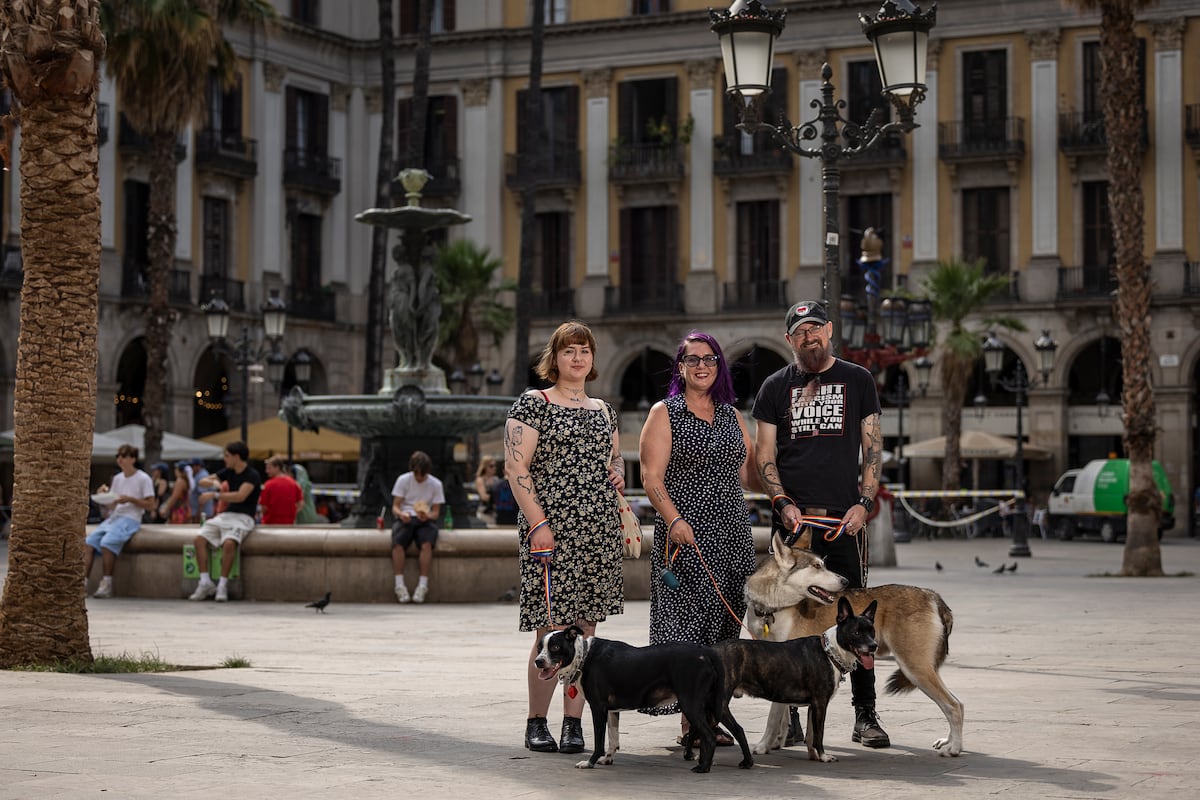Spain has become a refuge for Americans escaping Donald Trump’s authoritarian drift. Families who, without looking back, have landed with the intention of staying. For now, there aren’t too many. This isn’t an exodus or a migration crisis. But the Americans EL PAÍS spoke with see themselves, in part, as political refugees. In a journey reversing the one undertaken four centuries ago by the first settlers, they are crossing the Atlantic to feel safer and freer, far from a country where the rule of law is fading in the face of an unbridled leader.
Benjamin Gorman: “My country has become a source of shame”
This feeling that more and more citizens want to leave the U.S. is shared by Benjamin Gorman, a 48-year-old writer and high school teacher who has settled with his partner and his son (and their three dogs and two cats) in an apartment in Barcelona’s Gothic Quarter. “When Trump won, I knew we had to escape. Family and friends thought we were exaggerating. Now they call me for advice. History teaches us that the first to leave seem crazy, but the last ones don’t.”
Gorman, who grew up in Independence, Oregon, and has lived in Cincinnati, Ohio, feels like a “political refugee.” A racial justice activist, his criticism of history teaching in the United States earned him, he says, “death threats from Trump supporters,” the same threats his wife, Chrys, who is queer and neurodivergent, suffered. Frankie, their child, is transgender and non-binary. “If we’d waited any longer to leave, their passport would have been invalidated,” he says, referring to Trump’s order not to issue documents with the gender “x” or a gender different from the one assigned at birth.
They have settled in Spain for two reasons: Gorman speaks Spanish and they were able to apply for a digital nomad visa. In Barcelona, a city the professor was already familiar with, they feel “welcome.” Gorman understands, however, that expats like them can help increase housing prices, but he and his family, he says, want to be “positive members” of the city.
“My country has become a source of shame. Things are getting ugly faster than I expected. In Spain, I can speak without fear of censorship,” he says. “The most dangerous thing,” he adds, “is the attack on immigrants,” and how the Republican president’s decisions are generating “a great deal of suffering” and “fear” in certain sectors of the population. He believes refugee status for Americans will eventually become a reality.
The trip to Spain is, for now, one-way. “As long as Trump is president, I’m not going back,” says Gorman, who believes the effects will last beyond his second term. “I won’t feel safe in the U.S. for many years. Trump is a symptom of a larger cancer.”
Fred Guerrier in Madrid’s Retiro Park on August 8.INMA FLORESFred Guerrier: “I was fed up. I have mental space in Madrid”
Fred Guerrier was “fed up” with everything around him revolving around Trump. “I think it’s going to be a long time until all the things he’s done are undone. I probably won’t be alive when things get back to normal,” he says.
The 43-year-old arrived in New York from Haiti with his family at the age of seven. He and some friends run a production company that produces campaigns and ads for politicians and NGOs, but he decided to move to Madrid, arriving just a week ago, to clear his mind of politics: “If I’m going to spend my work hours dealing with politics, I want it completely out of my real life.”
He lived in the Spanish capital 14 years ago, working for one year as an English teacher. He’s returned to stay “long term” and believes that outside the U.S. he’ll no longer be so stressed by the situation and will have “time and mental space to write and develop projects.”
Trump’s actions have directly affected his company. It’s the first time in six years that it has had to promote itself to secure contracts. They know “a lot of people in politics” and have always “jumped from one job to another” through contacts. The reasons include funding cuts to social organizations, which can no longer afford to pay for their videos, and the general political confusion within the Democratic orbit. “People are still trying to figure out what happened in the last election, and which direction to go next,” he says.
With Trump’s return to the White House, he felt “powerless” because there were “so many things happening at once.” “Perhaps that’s the strength of his team,” he says, “doing so many things at once that it becomes overwhelming for political rivals.” “He’s burning down the entire building,” adds the filmmaker. “Only the few rich people at the top, the politicians, and the tech billionaires will be saved.”
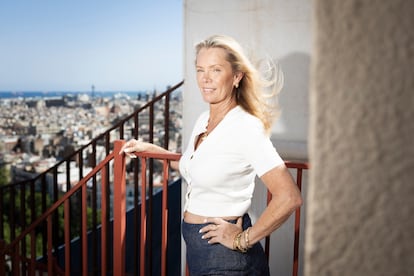 Chris Kelly, on the terrace of her apartment in Barcelona.Gianluca BattistaChris Kelly: “I noticed a lot of racism”
Chris Kelly, on the terrace of her apartment in Barcelona.Gianluca BattistaChris Kelly: “I noticed a lot of racism”
Chris Kelly, a Californian with blond hair and blue eyes, was encouraged to take the step by her 17-year-old mixed-race daughter. Both had taken to the streets during the Black Lives Matter movement (sparked by the death of George Floyd at the hands of the police), and the teenager began to feel uncomfortable about her skin color. “I noticed a lot of racism. She told me that if Trump won again, she wouldn’t want to be there anymore. I asked her if she was sure because she had to quit her dance classes and only had one year left to finish high school. She didn’t care,” Kelly explains on the terrace of an elegant café that has established a very American trend: tipping 10% or 20%.
Kelly and her daughter have been living in a “perfect apartment” in the Eixample district (at more than €2,000 a month in rent) for four months. They chose Spain because it was one of the countries, along with Portugal, that “allowed for visas to be obtained most quickly.” They chose Barcelona because they located an American school in Gràcia. They are here on a student visa, which allows Kelly to take Spanish classes. Kelly has left her “little house” in San Diego, California, and sold her car. She has only kept “10 boxes of memories,” which are in the hands of a friend, a sign that this is no vacation.
“We’re not going back to the U.S. The country is deeply divided, and that’s not going to be fixed with a new president. The damage Trump has done will last at least a generation,” says Kelly, who denounces the progressive loss of rights and freedoms under a president who “feels above the law.” Kelly has been horrified by the deployment of National Guard troops in Los Angeles and the raids against undocumented immigrants.
“My daughter could be mistaken for a foreigner and subjected to a process that no longer offers guarantees. She’s safe here, she rides public transportation alone, and she’s not afraid of a school shooting,” says Kelly, who has received support from her family. “Everyone says, ‘Can you take me with you?’”
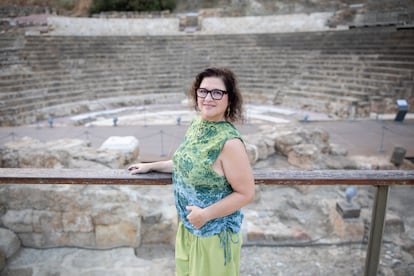 Deborah Harkness at the Roman Amphitheater in Málaga on August 9.García-Santos (El País)Deborah Harkness: “Cruelty has become normal in the US”
Deborah Harkness at the Roman Amphitheater in Málaga on August 9.García-Santos (El País)Deborah Harkness: “Cruelty has become normal in the US”
Deborah Harkness, 56, first set foot in Spain in 1993. She traveled to Seville to study the country’s language, literature, and history. It was “an awakening,” says this Boston-born American. “I felt something ancient and alive in the streets, in the voices, in the light… Life here doesn’t ask you to act. It asks you to be present.”
After decades of dreaming of moving to Andalusia, she took the plunge this year after Trump came to power. “I couldn’t continue surviving in a system that values profit more than people,” she explains, noting that the president is “almost a religious figure to his followers.” It’s reminiscent of “the early stages of Franco’s regime and Mussolini’s fascism,” she says: “Consolidating power, erasing the opposition, and making everything look legal.”
A human resources worker in the tech industry, Harkness lived in San Jose, California, where housing prices kept rising: she paid $3,200 a month for a one-bedroom apartment. Food costs and health insurance kept going up too… “I felt trapped, always one crisis away from losing everything. At the same time, I saw rights being curtailed, surveillance increasing, and cruelty becoming normalized.” “White privilege determined who received real care and who didn’t,” she says.
The final straw was the policies imposed by the president, she says, going on to list: “Undocumented people and U.S. citizens disappear without records or accountability, the legal system is saturated with malicious lawsuits, books are being banned, diversity, equality, and inclusion programs are being dismantled… Chaos and misinformation are how authoritarianism takes root.” For her, “public exhaustion” is part of the strategy: “Create so much chaos that people stop reacting.”
She packed her bags in June and, with the advantage of fluent Spanish, is settling into her new home in Málaga, where she helps out with the Democrats Abroad organization. “Málaga had everything I was looking for: deep roots, creative energy, access to nature, good healthcare, and a lower cost of living,” she says.
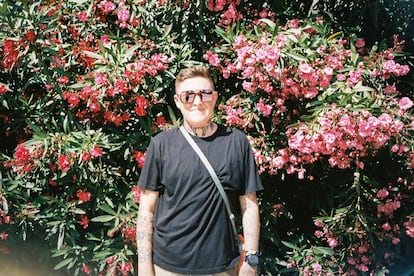 Leia Anderson in a courtesy image.Leia Anderson: “We want a safe place for our family”
Leia Anderson in a courtesy image.Leia Anderson: “We want a safe place for our family”
Leia Anderson, 41, and her family are preparing to leave Kansas City, Missouri, where she runs a coffee shop, Second Best Coffee, which she will transfer to her employees. “I’m happy; I know it’s in good hands and they’re invested in the community.” Leia, her partner, Nathan, and their two children (aged 10 and six) plan to settle in Barcelona in October, having spent a few weeks in the spring exploring the area. “I fell in love with this city; it’s very welcoming, and you can get around by public transportation.”
The family has hired an immigration lawyer to process a non-profit visa. The life they envision involves learning the language, exploring cafes and art, joining running communities, and “helping the children acclimatize.” To get an appointment at the consulate, they need to rent a home, although their goal is to buy. “We’re going to Barcelona with the intention of making it permanent. We want a safe place for our family.”
Leia is transgender and non-binary, so Trump’s initial executive orders targeting the community set off alarm bells. “It seemed like we were making progress on LGBTQ+ rights,” says Leia, who runs ultratrails and has fought for the acceptance of trans athletes in track and field events. “But Trump came along and declared there were only two genders. His administration has made it clear that he doesn’t want trans people to exist. The anti-trans rhetoric is so violent that I don’t feel safe anymore.”
The case of Kilmar Abrego García, deported to El Salvador, and the treatment of migrants in general left the couple in shock. “We’ve seen people kidnapped off the streets and deported to countries they’ve never seen.” Leia notes that more and more people are fleeing. “Not just abroad, but also to more progressive areas of the U.S.”
In Barcelona, her children “won’t have to do any more shooter drills,” and people, or so she thinks, won’t notice her surgical scars. “I’m happy. I’m going to stop worrying about people knowing I’m trans.”
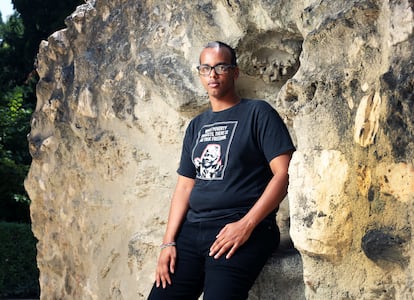 Musa Farah in Madrid, August 7.JAIME VILLANUEVAMusa Farah: “It’s very hard to live with a president who’s against you as a person”
Musa Farah in Madrid, August 7.JAIME VILLANUEVAMusa Farah: “It’s very hard to live with a president who’s against you as a person”
At 25, Musa Farah has become an immigrant for the second time. His family traveled from Kenya to Lewiston, Maine, when he was 10. “It’s hard being a Black student anywhere,” he says, but since Trump returned to the White House, “everything went crazy.” It was then that he began to consider living in another country: “It’s very hard to live with a president who is against you as a person, your beliefs, your race, your class… There are so many things against you.”
The young American citizen decided six months ago to move to Madrid, where he has been for just over a week, to finish his marketing studies. He plans to stay for two or three years and return to his country when the economic and social situation improves.
November 4, 2024, the day of the presidential election, was “very sad,” he says, as his environment, which, with its ups and downs, “had always been safe,” was no longer so. His car had a bumper sticker for Democratic candidate Kamala Harris. On November 5, he removed it: “We’ve always been Democrats in my house, but we’ve never been very involved.” Seven months later, he is more open about his ideals. “I’ve gotten more involved in politics because all of this has directly affected me, and also the people I know and love.”
Now he’s looking ahead to the midterm elections, which take place two years after the presidential elections, halfway through the legislative term. Farah’s efforts will focus on getting people to vote for congresspeople who can “shake things up.” He believes that when Trump finally leaves office, Americans will ask themselves, “What the hell was that?”
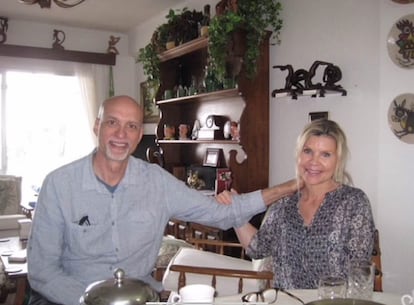 Richard and Susan Cope, in a courtesy image.Richard Cope: “I’m Jewish, I have a gay son, I know what can happen”
Richard and Susan Cope, in a courtesy image.Richard Cope: “I’m Jewish, I have a gay son, I know what can happen”
Richard Cope’s final service to his country was working as an election supervisor to ensure his neighbors could vote freely in the 2024 presidential election. “Who knows if that concept will even exist in two years,” he says. The next day, he boarded a plane with his partner, Susan, to leave Rhode Island behind and move to Nerja, Málaga. Seeing how “the political climate was going dangerously in the wrong direction,” they decided to sell their house and move to feel safer. “We’re in Spain because of the MAGA-fication of the United States,” the couple, who are in their 60s, emphasize.
The choice of the Málaga municipality was no coincidence. They discovered it in 2018 during a winter getaway, as they had seen many Europeans choosing it to spend the cold months. Also because the time difference with the American East Coast is six hours, which allowed Cope to continue working remotely as a medical data analyst (his wife is retired). They returned in the following years, and although they also tried Malta, Nerja seemed ideal for spending the winter. In 2024, three months had already passed. “It was the moment of Donald Trump’s resurgence and the realization that no one had the courage to stand up to him.”
“Being Jewish and having a gay son, I know all too well what happens when a society creates marginalized groups. They go from being unwelcome to being hated and then attacked,” Cope notes, recalling that both his grandparents and his wife’s grandparents fled to the U.S. more than a century ago in search of safety and peace. The Copes traveled for themselves, but also for their children and “future generations.” Thanks to the properties they acquired in Nerja, they obtained one of the last Golden Visas before Pedro Sánchez’s government revoked them.
“At one point, we thought we’d return to the U.S. every summer, maybe even buy a vacation home, but now maybe all our family will come to Spain every year, and we’ll stay where the weather is warm, the people are friendly, and life is an adventure,” Cope concludes.
Sign up for our weekly newsletter to get more English-language news coverage from EL PAÍS USA Edition
